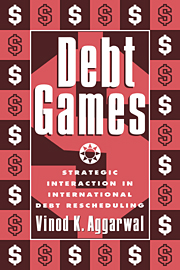Appendix
Published online by Cambridge University Press: 02 December 2009
Summary
This appendix will discuss how the bilateral model involving only a debtor and lenders, which might at first glance seem like a fairly simple one-shot game, compares to more elaborate models. The discussion will show that the goodwill term, rather than representing a primitive element of a player's utility function, is a composite of several important features common in standard dynamic models of debt negotiation. These “off-the-shelf” models were not used in this book for two reasons. First, most existing models use only economic variables, failing to capture the political concerns that make international debt negotiations distinct from domestic debt relations. Second, most models do not allow for systematic coding of their variables. The model in this book has been driven by an interest in utilizing models that can be operationalized empirically by different scholars with a considerable degree of consistency.
The unenforceability of international debt contracts presents the modeler with the problem of explaining why agents ever agree to give anything away during rescheduling negotiations. Economists have been ingenious in designing models which can account for some of the phenomena observed in this issue area. For example, Bulow and Rogoff use a bilateral bargaining game, which emphasizes the ability of players to impose costs on each other – not only through direct penalties but also by making counter-offers or imposing delays. Debtors and creditors vary in their ability to impose and to resist penalties.
- Type
- Chapter
- Information
- Debt GamesStrategic Interaction in International Debt Rescheduling, pp. 561 - 572Publisher: Cambridge University PressPrint publication year: 1996



